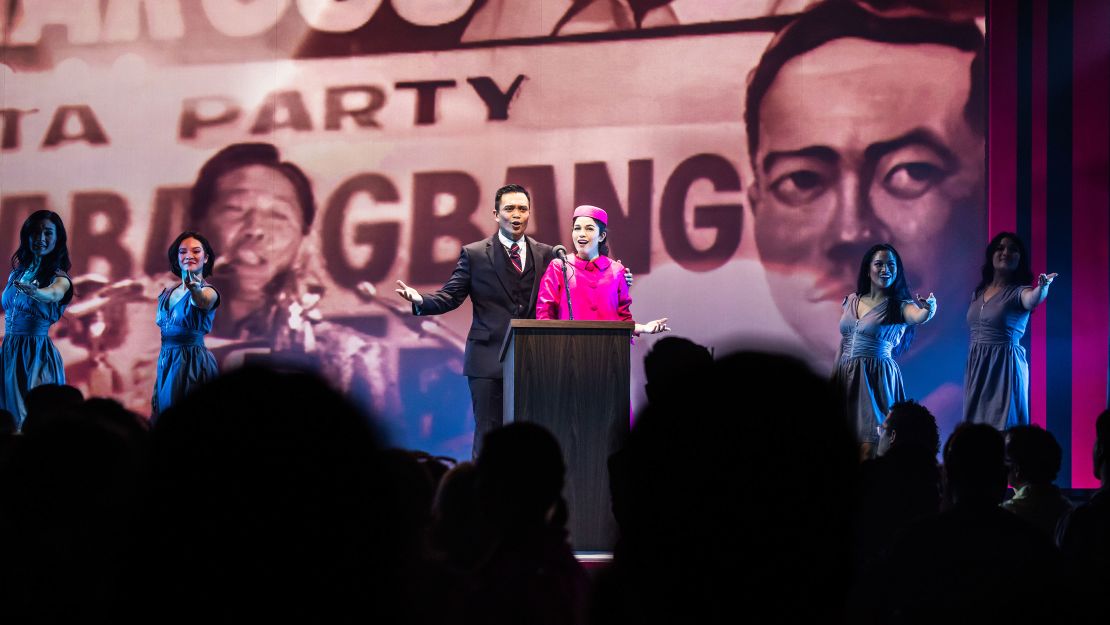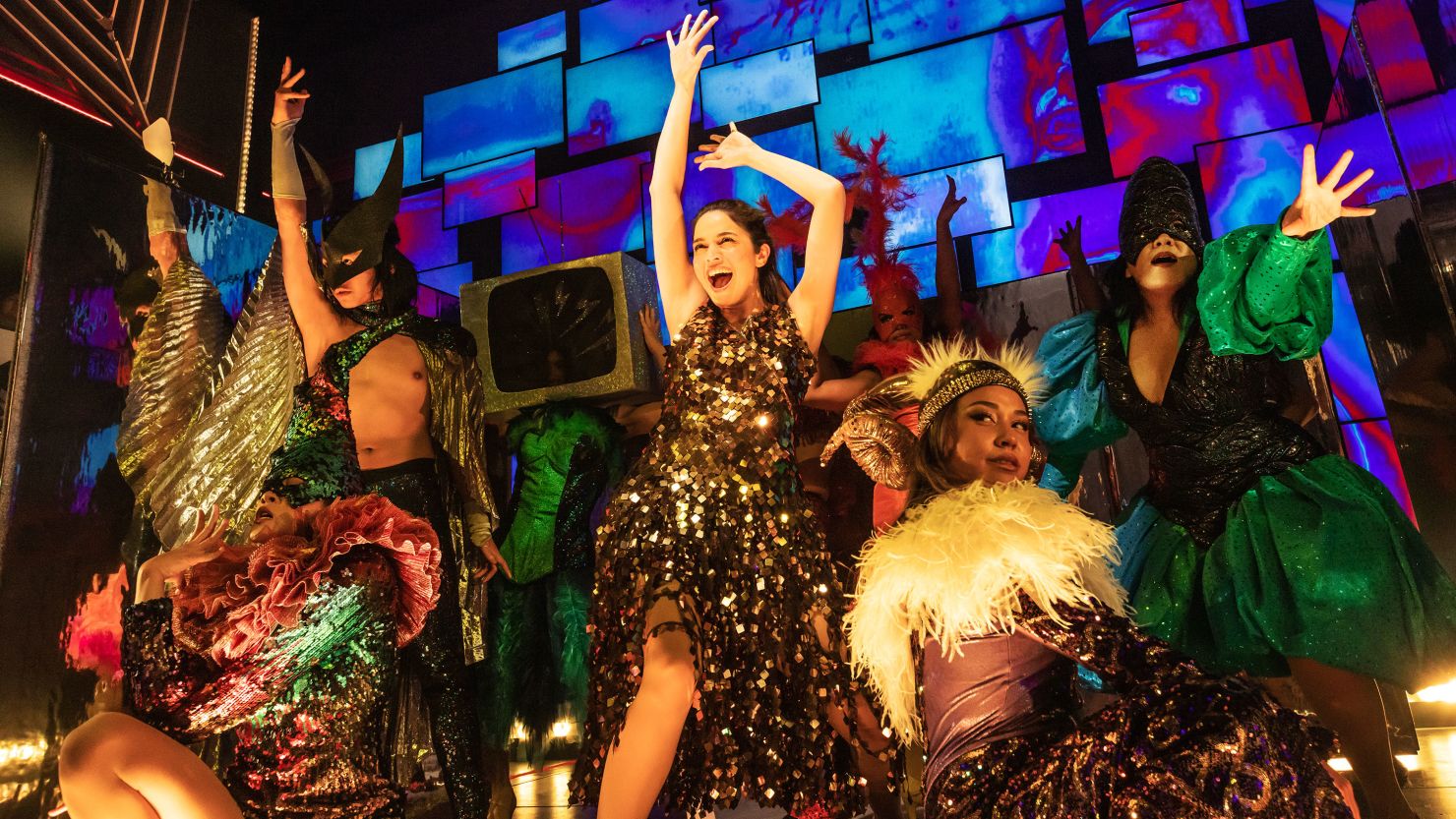Editor’s Note: Jeff Yang is a frequent contributor to CNN Opinion. He co-hosts the podcast “They Call Us Bruce,” and is co-author of the bestselling book “RISE: A Pop History of Asian America from the Nineties to Now” and author of the forthcoming “THE GOLDEN SCREEN: The Movies That Made Asian America.” The opinions expressed in this commentary are his own. Read more opinion on CNN.
When they arrived in America in the late 1960s, my immigrant Taiwanese parents followed a two-pronged strategy in their quest to rapidly assimilate themselves into the culture of their new home country: They took regular long subway rides uptown to cheer for the New York Yankees, and they bought a box of used vinyl classic albums of show tunes and listened to them obsessively.

It shouldn’t be a surprise that I grew up a passionate fan of both the Bronx Bombers and Broadway. Which is why I was so eager to see “Here Lies Love,” a new musical that many of my friends had been raving about. Created by the unlikely duo of David Byrne (of Talking Heads fame) and electronica pioneer Fatboy Slim, the show offered me a uniquely immersive experience, ecstatic choreography, a soundtrack of earworms and — for the first time ever on Broadway — a fabulous, all-Filipino cast.
The decision to fill the production’s array of pedestals and platforms with Pinoys wasn’t a coincidence. “Here Lies Love” is a rock-operatic exploration of the life of Imelda Marcos, wife and power-partner of the notorious president of the Philippines, Ferdinand Marcos.
As played by Arielle Jacobs (an iconic former Jasmine in Disney’s Broadway adaptation of “Aladdin”), Imelda’s character is in turns coy and cruel, glamorous and grotesque; she is a victim of her own self-indulgence and a victimizer of those who dare to remind her of her ragged childhood.
She’s horrific, but she’s also humanized. This complexity is perhaps inevitable in any piece of entertainment with a problematic protagonist, an extreme example being Stephen Sondheim’s emotional sleight-of-hand in his blockbuster black-comedy musical ”Sweeney Todd,” which somehow manages to make us feel a disconcerting level of empathy for a serial killer/cannibalism enabler.

But “Sweeney Todd” is wholly fictional, a character ripped from the pages of a Victorian penny dreadful titled, “The String of Pearls.” By contrast, “Here Lies Love” is rooted in real history, as audiences are reminded by a large factual timeline of Imelda’s life in the lobby of the Broadway Theatre, and on huge flat-screen TV arrays that flash archival and documentary footage the of the Marcoses’ decades of misrule behind and around the show’s discotheque-themed setting.
Even more unsettling is how very much present this historical past remains. Although the show climaxes with Imelda and Ferdinand Marcos fleeing offstage into exile, driven out of the Philippines by the bloodless but formidable “People Power” revolution of 1986, in truth Imelda Marcos returned home in 1989 after her husband’s death, successfully ran for the Philippines House of Representatives four times serving until 2019 and remains alive at age 94 and a major player in Filipino politics and culture even today.
Her son, Ferdinand “Bongbong” Marcos Jr., is the current president of the Philippines, while Imelda’s eldest child Maria Imelda “Imee” Marcos is a sitting senator. Bongbong’s son Sandro Marcos is senior deputy majority leader of the Philippines House of Representatives and Imee’s son, Matthew Manotoc, is governor of the Ilocos Norte province.
So there isn’t the same sense of historical distance as in the musical that many have cited as the direct antecedent, and maybe ancestor, of “Here Lies Love” — Andrew Lloyd Webber’s and Tim Rice’s beloved “Evita” — which similarly traces the rise from poverty to power of the fabulous spouse of an autocrat. “Evita” premiered in 1978 and debuted on Broadway in 1979; its title figure, Eva Perón, wife and political asset of Argentine president Juan Perón, died over a quarter-century earlier, in 1952.
The relative proximity of the Marcos era means that there are plenty of people who directly experienced and distinctly remember the abuses and terrors of that time. As one Filipino commenter said on Reddit, “‘Here Lies Love’ “is a harrowing reality for Filipinos who lived through martial law. It’s decades ago, but still too recent and still too f–king real.” Another responded, “I told my mother (who lived through the Marcos era in the Philippines, and came from a family particularly negatively impacted) that this show was being made and I thought she was having a PTSD flashback.”
I was called to the table myself after posting on X/Twitter that I’d enjoyed the show by a Filipina American acquaintance named Roma Panganiban, who pointed out that a “disco musical about the fascist dictator’s wife” was not exactly a “real win for ‘Asian diasporic history.’”

I told her she had a point. While the musical does put a spotlight on the Marcoses’ atrocities, which included the killing and extrajudicial imprisonment of thousands of protesters and political enemies and the embezzlement of an estimated $10 billion from an impoverished country (at one point listed as the greatest robbery of a government in history by the Guinness Book of World Records) these are just, as Panganiban said, “footnotes to a musical about Imelda” that simply reinforce Imelda Marcos’s status as “undoubtedly the most globally famous political figure from the Philippines.”
(It’s worth noting that despite the critical portrayal of her in the show, Imelda herself couldn’t deny the allure of being memorialized through musical theater. After being given the opportunity to listen to the soundtrack of the show by a New York Times reporter, she responded, “I’m flattered; I can’t believe it!”)
“Here Lies Love” is hardly the first musical to be rooted in dark history. “Bloody Bloody Andrew Jackson” looks at the life of the seventh US President, satirically depicting his deadly campaign to drive Native Americans out of their land.
“Cabaret” is set in Weimar Berlin, on the eve of the rise of Hitler, and more recent productions feature heart-stopping visual references to the concentration camps where 6 million Jews were systematically murdered. “The Sound of Music” is about a family’s flight from Austria ahead of its annexation by the Third Reich.
“Allegiance” highlights the experience of Japanese Americans who were unconstitutionally uprooted from their homes and incarcerated in camps during World War II. And in “Assassins,” Stephen Sondheim manages to upstage his earlier “Sweeney Todd” by making a musical focused on real-life murderers and attempted murderers of American presidents.
Each of these, like “Here Lies Love” and “Evita,” have also been accused of insensitivity and bad taste for turning tragic events into hummable, choreographed spectacles. Each has been attacked for simplifying, romanticizing or outright misrepresenting facts in their efforts to make history into entertainment.
And yet, there’s also the reality that these entertainments often push audiences with limited awareness of these real-world events to become interested in them and investigate them further.
The wild success of Lin-Manuel Miranda’s “Hamilton” led to soaring sales of the Ron Chernow biography of the founding father, over a decade after it was published. Actor George Takei, a principal driver behind the development of “Allegiance,” asserted that the musical milieu was an ideal way to address uncomfortable topics, because throughout history, anything people wanted to remember has been turned into song: “Music has the power to reach the depth of human emotion, as well as the height of passion,” he told Broadway World.
Get Our Free Weekly Newsletter
- Sign up for CNN Opinion’s newsletter
- Join us on Twitter and Facebook
I certainly found myself obsessively searching for and reading articles about the Marcos regime and its continuing legacy in the Philippines throughout my trip back home from the theater. But, as Panganiban pointed out to me, that may not be the case for everyone: “I believe in the power of entertainment to inspire critical reflection about our world,” she said. “I’m not so naive as to think that a Broadway musical is an inducement for every audience member to read up on Filipino history. For most people, what’s on stage is what they’ll leave with.”
It’s true that audiences seeking escape and entertainment are generally unlikely to dive deeper into the context behind the stories they see on the page, on screen or on stage. My parents didn’t know that “South Pacific” was an exotic fantasy full of Pacific Islander stereotypes when they sang along to “Happy Talk” and “Bloody Mary” — and neither did I, when I first joined them in doing so.
But I also recognize that “You’ve Got To Be Carefully Taught” was probably my first exposure to the notion that racism is a learned phenomenon. And if it weren’t for listening to and watching and loving that iconic Rodgers & Hammerstein musical as a kid, I wouldn’t have later been brought into conversations about how it reflects the shallow, ugly caricatures of Pacific peoples we too often take for granted in the world around us.
As with so many things, the sweet sugar coating of show tunes is a way to compel audiences that might otherwise ignore such issues to swallow uncomfortable truths.





